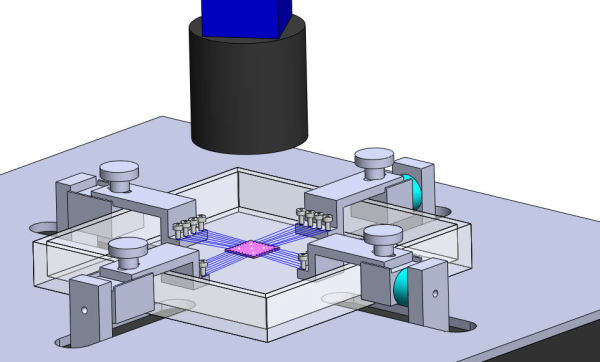Constitutive models are necessary to predict the mechanical behavior of biological tissues. However, biological materials present challenges in constitutive modeling due to their complex mechanical behavior. Their oriented fibrous structures often exhibit pronounced mechanical anisotropy. Due to anisotropy, stress strain data generated from uniaxial tests cannot be used to extrapolate to generalized three-dimensional constitutive equations. Since biological tissues are generally considered incompressible, planar biaxial testing allows for a two-dimensional stress-state that can be used to characterize their mechanical properties and validate the constitutive models.

Biaxial stress-strain measurements on soft biological tissues are generally difficult to perform. Some of the challanges include: small specimen sizes; gripping the specimens; differing gripping techniques producing inconsistent results; identifying material axes; large specimen-to-specimen variability; time-dependent changes due to biological degradation; and achieving homogeneity of deformation within the specimen.
Biaxial testing of biological tissues is performed using thin specimens, which are either a membrane in its native form or a thin section prepared from a thick tissue slab. The specimen is mounted to the biaxial device in trampoline-like fashion using thin threads (Figure 1), which allows the edges to expand freely in the lateral direction. (ADMET will design other grip solutions depending on material and customer requirements.) Testing is generally performed with the specimen completely immersed in phosphate buffered normal saline (pH 7.4) at room or body (37â—¦C) temperature, however, ADMET will accommodate testing that requires heating/cooling parameters. The central target region must be sufficiently small and located away from the outer edges to avoid the tethering effects. Thus, in the central target region the stress and strain field is generally considered homogeneous.

Figure 2 – ADMET planar biaxial test system general arrangement.
Figure 3- ADMET planar biaxial independent grips on rails.
ADMET’s planar biaxial testing system is designed specifically for soft materials and biological tissues. The two orthogonal actuators can be programmed to move independently or in a coordinated motion under force or defromation control. The testing system includes suture racks for gripping the specimen in trampoline like fashion. The suture racks are pinned to the moving crossheads for easy installation and removal. Another option is to attach several individual clips on the specimen and have the clips move independently to accommodate irregular elongation. Specimen baths and heating and cooling units for precise temperature control are also available. Various low force load cells and optical strain measurements provide accurate force-deformation data.









